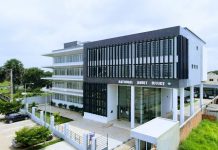By Assan Bah
The government has issued a strong warning to fertilizer agents selling above the official government price of D1,100 per bag, urging farmers across the country to report any such instances without delay.
This call follows widespread reports from farming communities that while fertilizer is available for this year’s cropping season, many farmers are being forced to purchase it at inflated prices, sometimes reaching as high as D1,225 per bag.
Farmers from different parts of the country confirmed to Foroyaa that there is sufficient fertilizer supply in their respective areas, yet the challenge remains with agents who set prices above the government set rate. The government, through the National Food Processing and Marketing Company (NFPMC), which oversees fertilizer distribution, has reiterated its commitment to ensuring fair pricing and accessibility to all farmers.
Speaking on the issue, the Managing Director of NFPMC, Mr. Muhammed Nije, issued a clear and uncompromising warning to those who attempt to take advantage of farmers by inflating fertilizer prices. “Farmers should report any agent who is selling more than D1,100,” Mr. Nije emphasized. He admitted that while the NFPMC cannot monitor every location at once, it relies heavily on farmers to alert authorities when prices exceed the set limit. “We cannot be everywhere but we are asking farmers to immediately report these things to us,” he said.
Mr. Nije was unequivocal on the matter of pricing, stating, “It was made very clear that the price is D1,100 and nothing more. It’s not, it’s not acceptable that anyone is selling more than D1,100. We will ban these agents outright. They are paid commissions and our contracts with them are very clear on this.” The firm stance from the NFPMC aims to curb illegal price inflation, which not only undermines government efforts to support farmers but also places additional financial burdens on those who depend on fertilizer for their livelihood.
Farmers from several regions have come forward with their experiences regarding fertilizer availability and pricing in their communities. In the Central River Region South, farmers in Jarreng, Kudang, Mamud Fanna, Bansang, and Batty Ndaar all confirmed that fertilizer is present, yet some reported price inflation caused by local agents. Ebrima Jallow of Bansang noted that although fertilizer is available, the CPMS (Cooperative Produce Marketing Societies) in his area are not selling, citing alleged debts owed to the Gambia Groundnut Corporation (GGC) related to unpaid fertilizer, rice, or groundnut deliveries. He disputed this claim, highlighting ongoing tensions between farmers and suppliers.
Similarly, Ebrima Mbye from Batty Ndaar stated, “There is fertilizer here but the price is inflated by the middlemen because they are selling at D1,150.” The extra cost above the official price adds pressure on farmers already facing economic challenges. The problem is not isolated to one region; farmers in the Central River Region North, such as those in Chamen Nianija and Sami Pachonki, also confirmed fertilizer availability but noted reliance on middlemen who sometimes sell fertilizer at prices ranging from D1,150 to D1,225. However, Biran Jaw Leba from the same region reported no fertilizer availability in his village, with residents instead having to purchase from the Kaur depot.
In the Upper Niumi district, farmers in Kerr Biran Kanyi, Passy Chally, Pakau Ngoogu, and Fass Omar Saho echoed similar sentiments. While fertilizer is generally available, the main challenge remains access and affordability due to inflated prices. Alagie Kaba Drammeh of Kerr Biran Kanyi said, “Fertilizer is available but the cooperatives are not selling it is the businessmen who are buying from the depot and reselling to us.” He went on to explain the underlying cause: “This is because they (GGC) said we are owing them. Since the end of the trade season they have not paid us our commissions despite having already fulfilled our obligation but they insisted on paying us our commissions. They are now here insisting on giving us fertilizer to sell.”
In Fass Omar Saho, farmers reported that while some agents sell fertilizer at the government-approved price of D1,100, others sell at inflated prices between D1,150 and D1,200. Mamud Njie, a farmer from Passy Chally, said fertilizer is sold on a demand basis, a practice that can sometimes leave smaller farmers at a disadvantage.
In the Lower Niumi district, Ebrima Jallow of Touba Angalleh, who previously served as a CPMS president, lamented that he is not selling fertilizer this year due to a lack of supply from the GGC. He claimed, “I have enquired from them but they said they are dealing with only those with strong financial resources. I don’t have 200,000 or 300,000 that I would buy fertilizer.” He added that while some farmers buy from neighboring villages, others are forced to purchase from the Barra depot, where additional costs are incurred. “They had to pay D20 per bag with D14 for loading and off-loading,” he said. A similar situation was reported in Ndungu Kebbeh.
Conversely, in several other districts, farmers confirmed that fertilizer is being sold at the official price. This includes communities such as Medina Sering Mass and Fass Ngaga Choi in the Lower Niumi district, Kerr Alagie Karu in the Jokadou district, and areas in Illiassa and Kerewan. Gallow Gaye of Ngayen Sanjal noted, “They buy from Kaur,” while a farmer in Sabach Nianyen also confirmed availability in his area. Musa Fofana of Jarra Dasilami mentioned that some farmers from his village buy fertilizer at D1,150 in Burreng. Dodou Barrow of Kiang Jifarong added that they often travel to Tendaba to purchase fertilizer, incurring fares ranging from D20 to D30 per bag. “We (the cooperative) used to have but they have not given us any reason,” he said.
Responding to concerns about why many CPMS groups were not contracted for fertilizer distribution this season, Mr. Nije explained, “They owe us. We don’t deal with farmers that owe us. That’s the only reason.” He stated that only one or two cooperatives had fully settled their arrears and were therefore involved in this year’s fertilizer sale. “Some owe us groundnut, fertilizer or rice during the previous seasons,” he added. “They have to settle these liabilities first.”
Due to these financial disputes, NFPMC has engaged private agents to cover areas where CPMS groups were excluded, ensuring that farmers have continued access to fertilizer. This approach aims to bridge gaps in distribution and maintain steady supply chains during the critical cropping period.
The NFPMC is a government agency tasked with overseeing fertilizer distribution and ensuring that agricultural inputs are accessible and affordable to Gambian farmers. The government’s firm stance against price inflation is part of wider efforts to bolster agricultural productivity and support the livelihoods of the country’s farming communities.
Farmers are encouraged to cooperate with authorities by promptly reporting any agents or middlemen selling fertilizer above the set price. Such cooperation is vital to safeguarding the agricultural sector and protecting farmers from exploitative practices.
“Our goal,” Mr. Nije concluded, “is to ensure that every farmer, regardless of location or economic status, can access fertilizer at the right price. Anyone who stands in the way of that goal will be held accountable.”




















